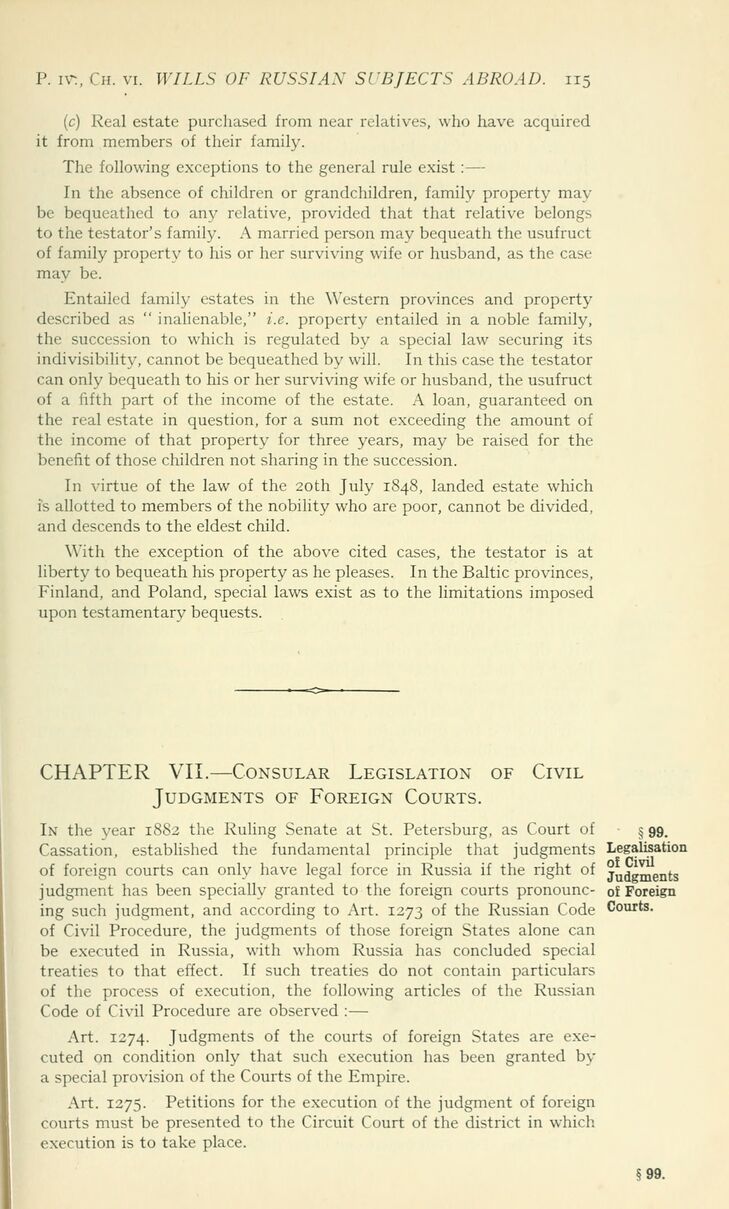
Full resolution (JPEG) - On this page / på denna sida - Pages ...

<< prev. page << föreg. sida << >> nästa sida >> next page >>
Below is the raw OCR text
from the above scanned image.
Do you see an error? Proofread the page now!
Här nedan syns maskintolkade texten från faksimilbilden ovan.
Ser du något fel? Korrekturläs sidan nu!
This page has never been proofread. / Denna sida har aldrig korrekturlästs.
P. IV4., Сн. VI. WILLS OF RUSSIAN SUBJECTS ABROAD. 115
(c) Real estate purchased from near relatives, who have acquired
it from members of their family.
The following exceptions to the general rule exist:—
In the absence of children or grandchildren, family property may
be bequeathed to any relative, provided that that relative belongs
to the testator’s family. A married person may bequeath the usufruct
of family property to his or her surviving wife or husband, as the case
may be.
Entailed family estates in the Western provinces and property
described as " inalienable," i.e. property entailed in a noble family,
the succession to which is regulated by a special law securing its
indivisibility, cannot be bequeathed by will. In this case the testator
can only bequeath to his or her surviving wife or husband, the usufruct
of a fifth part of the income of the estate. A loan, guaranteed on
the real estate in question, for a sum not exceeding the amount of
the income of that property for three years, may be raised for the
benefit of those children not sharing in the succession.
In virtue of the law of the 20th July 1848, landed estate which
is allotted to members of the nobility who are poor, cannot be divided,
and descends to the eldest child.
With the exception of the above cited cases, the testator is at
liberty to bequeath his property as he pleases. In the Baltic provinces,
Finland, and Poland, special laws exist as to the limitations imposed
upon testamentary bequests.
CHAPTER VII.—Consular Legislation of Civil
Judgments of Foreign Courts.
In the year 1882 the Ruling Senate at St. Petersburg, as Court of
Cassation, established the fundamental principle that judgments
of foreign courts can only have legal force in Russia if the right of
judgment has been specially granted to the foreign courts
pronouncing such judgment, and according to Art. 1273 of the Russian Code
of Civil Procedure, the judgments of those foreign States alone can
be executed in Russia, with whom Russia has concluded special
treaties to that effect. If such treaties do not contain particulars
of the process of execution, the following articles of the Russian
Code of Civil Procedure are observed :—
Art. 1274. Judgments of the courts of foreign States are
executed on condition only that such execution has been granted by
a special provision of the Courts of the Empire.
Art. 1275. Petitions for the execution of the judgment of foreign
courts must be presented to the Circuit Court of the district in which
execution is to take place.
§99.
§99.
Legalisation
of Civil
Judgments
of Foreign
Courts.
<< prev. page << föreg. sida << >> nästa sida >> next page >>